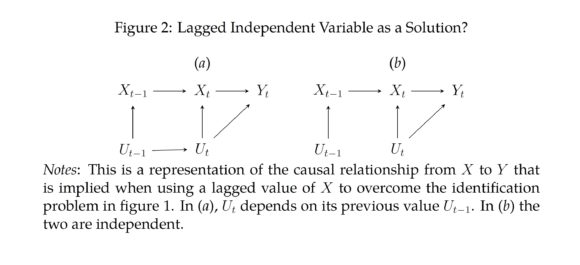I have some good news to share. My paper with Tom Pepinsky and Taka Masaki titled “Lagged Explanatory Variables and the Estimation of Causal Effects” has been accepted for publication and is forthcoming in the Journal of Politics.
Because an image is worth a thousand words, here is one of the key figures in the paper, which illustrates in panel (a) what the problem is with using the lag of an explanatory variable to “exogenize” it, and in panel (b) the hard-to-swallow assumption the needs to be made in order for this trick to work:
Here is a link to the latest version of the paper, and here is the abstract:
Lagged explanatory variables are commonly used in political science in response to endogeneity concerns in observational data. There exist surprisingly few formal analyses or theoretical results, however, that establish whether lagged explanatory variables are effective in surmounting endogeneity concerns and, if so, under what conditions. We show that lagging explanatory variables as a response to endogeneity moves the channel through which endogeneity biases parameter estimates, supplementing a “selection on observables” assumption with an equally untestable “no dynamics among unobservables” assumption. We build our argument intuitively using directed acyclic graphs and then provide analytical results on the bias of lag identification in a simple linear regression framework. We then use Monte Carlo simulations to show how, even under favorable conditions, lag identification leads to incorrect inferences. We conclude by specifying the conditions under which lagged explanatory variables are appropriate responses to endogeneity concerns.
